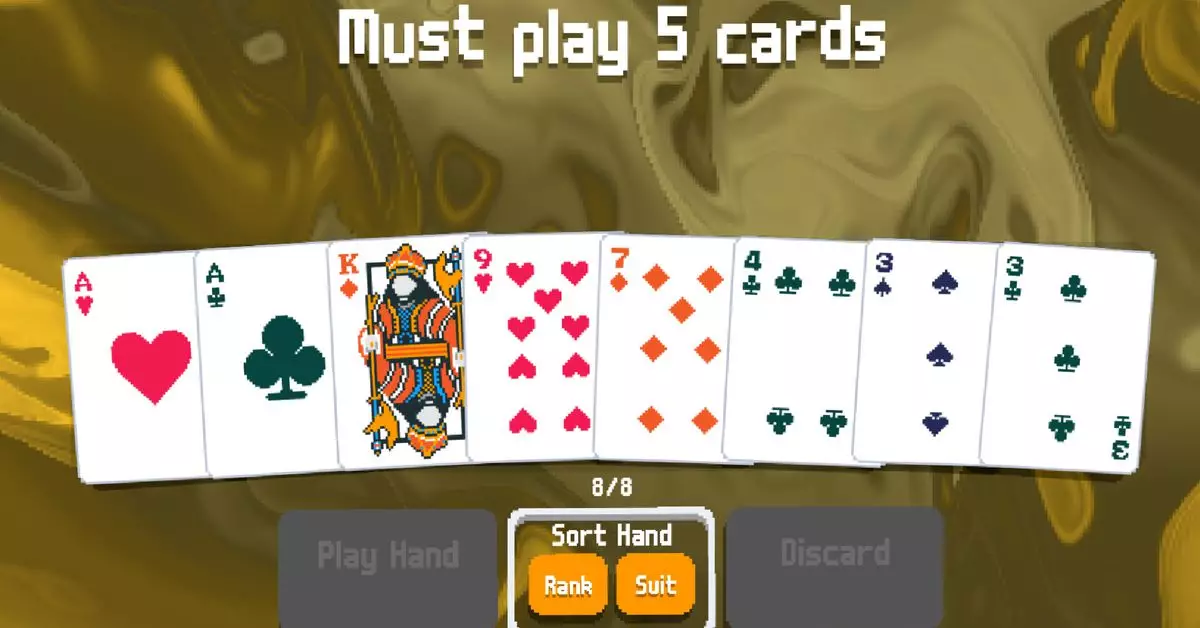The world of video game ratings presents a complex and often controversial discourse, especially when evaluating the implications behind them. Recently, a notable incident surrounding the game Balatro—a poker roguelike developed by the creator known as LocalThunk—has sparked conversations about the stark contrast in ratings assigned to games that incorporate elements of chance. Balatro’s situation is especially provocative as it navigates through the waters of PEGI (Pan European Game Information) regulations, drawing attention to discrepancies in what constitutes acceptable and unacceptable content in gaming.
Balatro began its journey with a benign rating of 3-plus, but within a few months of its release, it was inexplicably reclassified to an 18-plus rating by PEGI. This abrupt change has had tangible repercussions, including the delisting of the game from numerous digital storefronts across various countries. The rating emerged largely due to an association of the game with “prominent gambling imagery,” as outlined by PEGI. While it is essential to understand the guidelines under which these ratings are given, the implications for indie developers such as LocalThunk are significant. The sudden switch to an adult rating not only restricts the audience but also raises questions about whether the assessment accurately reflects the content of the game.
LocalThunk has openly articulated their frustrations on social media, suggesting an almost absurd paradox: the idea that integrating “microtransactions, loot boxes, or real gambling” could cause Balatro’s rating to drop dramatically, as seen in mainstream titles like EA Sports FC. Here lies an important critique of the gaming rating system: it appears to create an environment where certain gambling mechanics, even in a non-traditional sense, are more palatable than a straightforward gaming experience centered around skills and knowledge.
PEGI’s justification for its decision revolves around the notion of teaching players poker skills—card combinations, game strategy, and related rewards. Critics of this rationale might argue that, while Balatro illustrates poker mechanics, it does not, in essence, embody gambling as players do not ‘bet’ real money. The game could be more likened to educational tools that aim to enhance strategic thinking rather than promoting gambling behavior.
During discussions with PEGI, LocalThunk claims that representatives regarded the rating as appropriate, citing EU laws and the nuances of the digital storefronts as contributing factors. This explanation unravels an intricate web of regulatory complexities where adherence to existing laws often overshadows the moral and ethical questions about the nature of gaming experiences themselves.
This incident invites a broader conversation about how gambling elements are integrated into video games today. Mainstream titles featuring loot boxes or in-game purchases often target a much younger demographic, warranting a lower age rating despite featuring actual gambling mechanics where money can be directly influenced. Meanwhile, more straightforward titles like Balatro face a higher rating due to their portrayal of gambling imagery, creating an uneven playing field for games developed with no intentions of exploiting chance for profit.
LocalThunk’s decision to ensure that Balatro will never be sold or licensed to a gambling company further emphasizes a commitment to maintaining the integrity of their creation. This ideological stance stands in stark contrast to the monetarily driven objectives of many large-scale gaming companies that capitalize on chance mechanics to monetize their products aggressively.
The uproar surrounding Balatro serves as a crucial reminder that the current gaming rating framework may need reconsideration and recalibration. It raises fundamental questions regarding what elements should factor into a rating and brings attention to the inconsistency in evaluations across the board. The disparity between rankings for sheer gambling mechanics versus educational or strategy-based gameplay is indicative of a larger systemic issue that needs to be addressed.
As gaming continues to evolve and intertwine with socio-economic threads, it is imperative for regulators like PEGI to reflect on their rating criteria—fostering a balanced environment that honors creative innovations without imposing undue penalties on those that challenge conventional gambling narratives.

